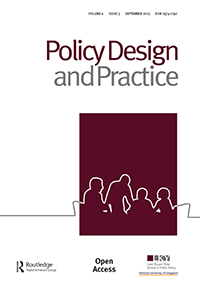Setting the table for policy intrapreneurship: public administrator perspectives on local food system governance
IF 2.6
Q1 PUBLIC ADMINISTRATION
引用次数: 2
Abstract
Abstract In communities across the U.S., there is growing awareness of food system issues which exerts greater pressure on public servants to help build a better food system for their community. Drawing from interviews with local and state-level public administrators and elected officials in two metropolitan regions in Ohio and New Jersey, and supporting interviews from food producers and nonprofit leaders in those areas, this paper examines what roles public administrators believe they could and should take regarding food system development in their community. From this qualitative data analysis, the research identified commonalities in administrators’ positive and negative perceptions of the potential for development of their community’s local food system (LFS) despite their lack of background knowledge regarding these systems. Given food systems’ interdisciplinarity and complexity, LFS development likely requires multi-sectoral alliances via partnership governance. The alliance itself and each of its components is simultaneously a complete entity and a part of a larger, more complex entity; such entities are called holons. These alliances have greater capacity to manage more complicated problems than can be addressed by subordinate holons. In examining the potential role of local public administrators in LFS development, this paper constructs the concept of the policy intrapreneur to clarify our understanding and discussions of how public administrators, decision-makers, and other stakeholders view their roles and responsibilities in the creation and governance of local food systems.为政策内部创业奠定基础:公共管理者对地方粮食系统治理的看法
在美国各地的社区,人们越来越意识到食品系统问题,这给公务员施加了更大的压力,要求他们帮助建立一个更好的食品系统。本文通过对俄亥俄州和新泽西州两个大都市地区的地方和州级公共管理人员和民选官员的采访,以及对这些地区的食品生产商和非营利组织领导人的支持采访,研究了公共管理人员认为他们可以并且应该在社区食品系统发展方面发挥什么作用。从这一定性数据分析中,该研究确定了管理者对其社区当地粮食系统(LFS)发展潜力的积极和消极看法的共性,尽管他们缺乏有关这些系统的背景知识。鉴于粮食系统的跨学科性和复杂性,LFS的发展可能需要通过伙伴关系治理建立多部门联盟。联盟本身及其每一个组成部分既是一个完整的实体,又是一个更大、更复杂实体的一部分;这样的实体被称为空子。这些联盟比从属联盟更有能力处理更复杂的问题。在研究地方公共管理者在LFS发展中的潜在作用时,本文构建了政策内部企业家的概念,以澄清我们对公共管理者、决策者和其他利益相关者如何看待他们在地方粮食系统创建和治理中的角色和责任的理解和讨论。
本文章由计算机程序翻译,如有差异,请以英文原文为准。
求助全文
约1分钟内获得全文
求助全文
来源期刊

Policy Design and Practice
PUBLIC ADMINISTRATION-
CiteScore
10.30
自引率
4.30%
发文量
19
审稿时长
13 weeks
期刊介绍:
 求助内容:
求助内容: 应助结果提醒方式:
应助结果提醒方式:


